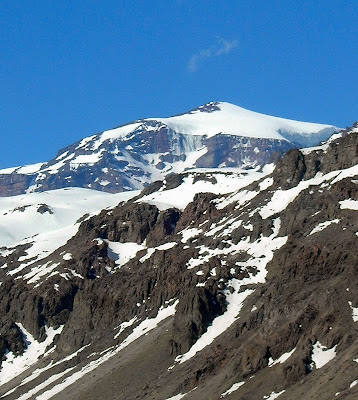17 November 2008
Por última vez
Bill and Annie passing through, and me with a wish to spend a final long day in the mountains. Seven o'clock Sunday morning, Santiago is a city hardly recognizable. A perfect time to navigate the usually hair-pulling roadways.
The large plan was to catch up with Bill and Annie at the Plantat hut on Volcan San José. They moved to the hut from Refugio Lo Valdes a day earlier and would rest before heading farther up toward the summit. My smaller plan was to use up as much sunlight as possible to hike, walk, climb, and ski on and around this far western end of the Cajon del Maipo--only a few short but steep kilometers, as the condor flies, from the Argentine border.
Though defined as a Mediterranean climate, the Central Cordillera borders precipitously on the desert. With average annual precipitation totals at only 15 inches (38 cm), you're never too far from dust. And when you're missing the last big spring storm like we have the last two years the effects are even more severe. So much so, you start to question hauling skis through a landscape more suitable to tarantulas than snow.
But you wander farther and higher and your judgment corrects itself and your day is redefined. Desert or not, precipitation or not, in the Central Cordillera snow is ever-present. Eventually. And this tends to make me happy. And I can still appreciate tarantulas.
Then you turn a corner and break through the dust and an entirely new world unravels. And you still have a long way to go. The long crater summit of Volcan San José (19,212ft/5,855m) and in the far back left of the photo Cerro Marmolejo (20,039ft/6,107m) the world's southernmost 6,000 meter peak:
From there it's another two hours across the wide Marmolejo basin to the base of Volcan San José and up to the Refugio Plantat.
Andes Handbook has this to say about the Refugio Plantat:
One of the most noteworthy and famous features of this volcano is the Refugio Plantat. This shelter (3110 masl), which by the way, makes for a great day hike, was built by don Enrique Plantat in 1937, using the plans of an already built mountain hut in the Alps. He did this beacuse of his fondness for guanaco hunting in the area. This is not strange if we think that even today it is heard of guanacos in other areas of the Central Andes, like in the Piuquenes landmark. At first, Refugio Plantat was equipped with tap water, a stove and other advantages, but the pass of time has been ruthless. It now has eight litters, which are an excellent sleeping option when not in peak season.
I spotted no guanacos and I can't vouch for the comfort of the eight "litters". I chased a group of hikers up to the hut, though, found Bill and Annie, and met the local camp robber.
The rest of the day was spent climbing higher for more and better views, avoiding fields of penitentes, and trying to imagine that the day would never end. It was pretty much what I expected and pretty much what I wanted to happen. In between there were short interludes of shared tea, conversations with locals, staring at glaciers, and resting on rocks. The skiing wasn't so good but it didn't matter much. The day was long and my legs kept pushing me up. Sometimes all that matters is the ambivalence of because and the perfect knowledge of time in the mountains spent in solitude.
Some rewards come at the end of the day, after the sweat and dust and chafing winds. A last batch of empanadas at closing time, mote con huesillo, and fresh aji pebre will help boost most any occasion from great to greater.
Nowhere else to go from here. It's time to surrender the Andes back to the capable hands of Andrés, brother Franco, Julián, Hartmut, Carlos, and too few others.
The long and winding road; may it always return to the Andes.
(If you can't see a small, blue square and triangle that resembles a play button, go here and follow directions. Installing this will allow you to read and listen to music at the same time--like a real live multitasker!)
Subscribe to:
Post Comments (Atom)

















1 comment:
Very pretty post. Signed your jenshina.
Post a Comment